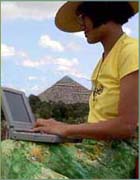
The United States Trek Overview
The Odyssey grew out of a series of meetings conducted in 1996 by a group of educators concerned with the lack of global awareness among youth, particularly in light of the increasing impact global issues have on the quality of life for people everywhere. The Odyssey was incorporated in September of 1997, followed by six months of laying the organization's foundation and investiging ways to use the Internet to more effectively educate youth on international issues. In that time:
- Six focus groups were held with teachers and youth, and experts in service learning and ed-tech
- Over thirty teachers and fifty students were consulted individually
- Over ten on-line educational programs were surveyed for strengths and weaknesses
- Relevant research papers and books were reviewed.
The World Trek - Some Quick Facts
 |
- The World Trekkers travelled over 35,000 miles and filed over 850 dispatches from over 40 countries.
- They spent six weeks in each of the ten major destination sites: Guatemala, Peru, Zimbabwe, Mali, Egypt, Israel, Turkey, Iran, India and China.
- The website received over 1700 unique visits every day during that schoolyear, and was accessed from over 90 countries.
- The World Trek featured both live and on-demand video of interviews with three Nobel Peace Prize Laureates, two Right Livelihood Award winners, an Africa Prize Laureate, a member of the Truth and Reconciliation Commission in South Africa, and a former President of "Rhodesia."
- The World Trek hosted over 20 live chats with studnets from around the world, including from a Palestinian refugee camp, a tent city in Turkey following the earthquakes, and Tehran, Iran.

|
In the fall of 2000, The Odyssey undertook the US Trek, an eight-month long trek through time and space with three purposes:
- To engage students in established US History curriculum more effectively than traditional materials and methodologies.
- To introduce students to diverse perspectives and critical issues too infrequently addressed in established curriculum.
- To engage students in service to their communities and general society.
The Itinerary
 |
The following is a quick look at the general topics that were covered and when during the first semester::
I. In Search of American Roots
9/13 : First Team Update - The Diverse Histories of the US Trek Team
9/16 : The Geography of the United States
9/20 : Human Origins in the Americas
9/23 : Native Americans - Major Cultural Groups (pre-Contact)
9/27 : Native Americans - Major Developments and
Diverse Cultural Characteristics (pre-Contact)
9/30, 10/4 : The Early Explorers and the Colonists
10/7 : Lifestyles of the Not So Rich or Famous -
Indentured Servants, the Lower Class, and Women
10/11 : Slavery in the Colonies and Early African American Culture
10/14 : Native American Responses Up To the American Revolution
II. The Birth of the United States
10/18 : Revolutionary Flashpoints - Issues, People and Places
10/21 : The Unfolding of the American Victory
10/25 : Foundations of the US Government
III. Manifest Destiny
10/28 : US Expansion Through the Mid-1800's
11/1 : Native American Responses Through the Mid 1800's
11/4 : The Mexican-American War
11/8 : The Economic Machine and the Reaction
11/11 : The Age of Reform
11/15 : The Women's Rights Movement
IV. The Civil War and Reconstruction
11/18 : Life in the South
11/22 : Paths of Resistance and Rebellion
11/25 : Thanksgiving Break - No Update
11/29 : Life in the North
12/2 : The Abolitionists
12/6 : Flashpoints on the Road to the War - People, Places and Motivations
12/9 : The Civil War
12/13 : The Question of Emancipation and the End of the War
12/16 : Reconstruction Begun
12/20 : The Fall of Reconstruction
V. The United States Transformed
12/23, 1/3 : National Expansion, Industrialization, and Immigration
1/6 : Industrialization
1/10 : The Rise of Unions
1/13 : National Politics - The Interstate Commerce Act and Sherman Anti-Trust Act
For each of these broad themes, we identified several specific topics to explore. For example, for the October 11 update, addressing "Slavery in the Colonies and Early African American Culture," the following topics were also addressed:
For each of these topics, members of the US Trek Team split up to visit places and people that bring the topics to life. For example, for taht same update the Team's visits included:
- The Songhai, Mali and Ghana Empires
- Slave Capture and Transportation
- Slavery in the Colonies - Conditions and Controls
- Slave Women
- Early Slave Resistance
- "Free" Black Life in the US
- Early African American Culture
- The African Burial Ground
- Underwater excavations of the Henrieta Marie, a sunken slave ship
- Somerset Place in Creswell, NC, to explore slave conditions
- Natchez, MS, site of the Natchez Rebellion
- Penn Community Center, St. Helena, Sea Islands, which has preserved vestiges of virtually independent black culture
The Teacher Zone
There is a separate teacher zone where the itinerary was laid out in detail, to allow teachers to plan ahead and to give them activity suggestions. Because all of the materials was archived, it can be used by teachers any time with a variety of classes.
So, Um, How Is This All Done?
The Odyssey was 100% volunteeer-run. Over 500 people contributed their time and counsel to the effort. It was quite a technical and logistical challenge to pull this all together. We hope you enjoy both our Treks! Thanks for joining us!
- From all of us at The Odyssey
![]()
![]()
![]()
![]()
![]()
![]()
![]()
![]()
![]()
![]()
![]()
![]()
![]()
©2000 The Odyssey: World Trek for Service and Education. All rights
reserved.